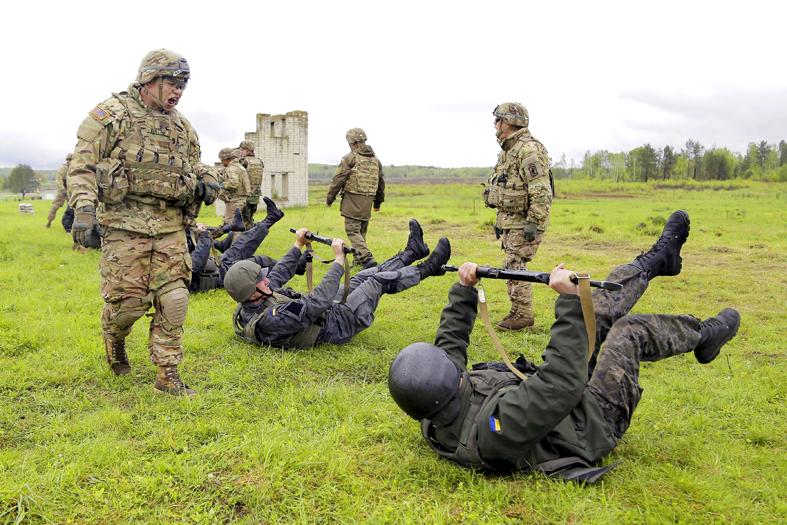Taiwan’s armed forces are later this year to send noncommissioned officers (NCOs) to the US to observe training to bolster joint operations between the two nations, a military source said on Wednesday.
An undisclosed number of Taiwanese NCOs would in the coming months visit the US military’s Joint Readiness Training Center and the US Army’s Asymmetric Warfare Group to observe how the US military trains its NCOs, the source said on condition of anonymity.
The armed forces have previously only sent high-level officers on such observation trips to the US.

Photo: Reuters
Without disclosing when NCOs would visit the US or how long each group would stay, the source said that it marks the beginning of a three-year program that the military would review after it is completed.
Such trips would benefit Taiwanese NCOs, the source said, adding that knowing how the US trains its NCOs, including differences between military branches, would help in joint operations, especially given the multidimensional threat that Taiwan faces from China.
Before the introduction of the program, Ministry of National Defense Chief Sergeant Pan Wen-ching (潘文清) led a small group of NCOs to the US late last year, the source added.
On that visit, from Dec. 1 to 10, the group visited the US Army’s Indo-Pacific Command, Special Operations Command Pacific and the 25th Infantry Division’s Lightning Forge exercise, which typically serves as preparation for a rotation at the Joint Readiness Training Center in Fort Polk, Louisiana, the source added.
In Taiwan and the US, NCOs are the backbone of the army, and have the responsibility to ensure that the soldiers under them are combat ready.
A Ministry of National Defense report to the Legislative Yuan earlier this year said that about 90,000 of the armed forces’ 180,000 members are NCOs.
Defense experts applauded Wednesday’s decision, saying that the US trips would boost the professionalism of Taiwan’s NCOs and enhance the combat readiness of its soldiers.
Institute for National Defense and Security Research analyst Su Tzu-yun (蘇紫雲) said that it is a positive sign that the two nations are offering exchanges for lower-ranking personnel, when they used to only be offered to officers.
Unlike officers, who are frequently rotated to other units, NCOs stay in a unit longer, and are more familiar with the unit and its weapons systems, Su said.
Chieh Chung (揭仲), an associate research fellow at the National Policy Foundation in Taipei, said that NCOs in the US military are the core of combat units.
In the US, senior personnel make decisions, while the NCOs are in charge of execution and guiding the soldiers, he said.
Institute for National Defense and Security Research analyst Shu Hsiao-huang (舒孝煌) said that Taiwan’s NCOs typically only receive local training and do not have the opportunity to conduct exchanges with other nations’ militaries.
Over the past year, the US has launched more exchange programs to enhance the combat readiness of militaries in allied nations that are equipped with US weapons systems, he added.

Taiwan has received more than US$70 million in royalties as of the end of last year from developing the F-16V jet as countries worldwide purchase or upgrade to this popular model, government and military officials said on Saturday. Taiwan funded the development of the F-16V jet and ended up the sole investor as other countries withdrew from the program. Now the F-16V is increasingly popular and countries must pay Taiwan a percentage in royalties when they purchase new F-16V aircraft or upgrade older F-16 models. The next five years are expected to be the peak for these royalties, with Taiwan potentially earning

STAY IN YOUR LANE: As the US and Israel attack Iran, the ministry has warned China not to overstep by including Taiwanese citizens in its evacuation orders The Ministry of Foreign Affairs (MOFA) yesterday rebuked a statement by China’s embassy in Israel that it would evacuate Taiwanese holders of Chinese travel documents from Israel amid the latter’s escalating conflict with Iran. Tensions have risen across the Middle East in the wake of US and Israeli airstrikes on Iran beginning Saturday. China subsequently issued an evacuation notice for its citizens. In a news release, the Chinese embassy in Israel said holders of “Taiwan compatriot permits (台胞證)” issued to Taiwanese nationals by Chinese authorities for travel to China — could register for evacuation to Egypt. In Taipei, the ministry yesterday said Taiwan

Taiwan is awaiting official notification from the US regarding the status of the Agreement on Reciprocal Trade (ART) after the US Supreme Court ruled US President Donald Trump's global tariffs unconstitutional. Speaking to reporters before a legislative hearing today, Premier Cho Jung-tai (卓榮泰) said that Taiwan's negotiation team remains focused on ensuring that the bilateral trade deal remains intact despite the legal challenge to Trump's tariff policy. "The US has pledged to notify its trade partners once the subsequent administrative and legal processes are finalized, and that certainly includes Taiwan," Cho said when asked about opposition parties’ doubts that the ART was

If China chose to invade Taiwan tomorrow, it would only have to sever three undersea fiber-optic cable clusters to cause a data blackout, Jason Hsu (許毓仁), a senior fellow at the Hudson Institute and former Chinese Nationalist Party (KMT) legislator, told a US security panel yesterday. In a Taiwan contingency, cable disruption would be one of the earliest preinvasion actions and the signal that escalation had begun, he said, adding that Taiwan’s current cable repair capabilities are insufficient. The US-China Economic and Security Review Commission (USCC) yesterday held a hearing on US-China Competition Under the Sea, with Hsu speaking on